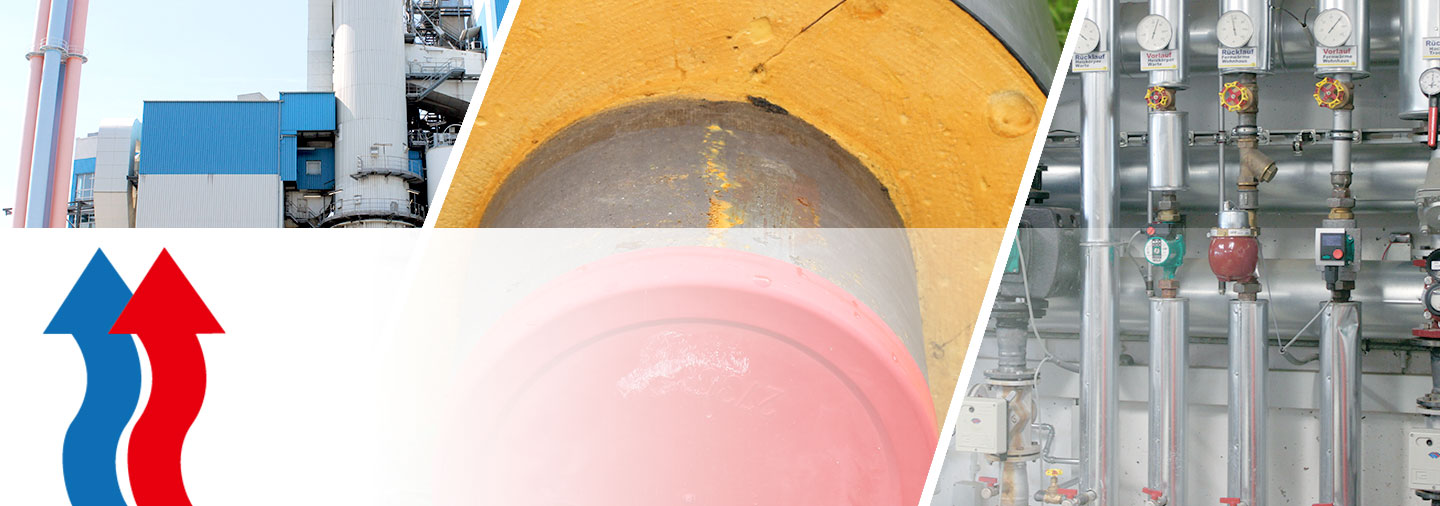

News & Veranstaltungen
WS 7, Sitzung 3: Wie sollte die EU-Bioökonomiestrategie und ihre bevorstehende Überprüfung Herausforderungen im Zusammenhang mit bioökonomischen Kompromissen angehen?
WS7, Sitzung 2: Biomassenutzung und Ernährungssicherheit: Synergien und Herausforderungen
WS7, Session 1: Ausbalancierung sozioökonomischer und ökologischer Ziele: Indikatoren, Werkzeuge und praktische Einblicke
WS6, Session 3: Governance von regionalen biobasierten Systemen
WS6, Session 2: Governance von regionalen biobasierten Systemen
WS6, Session 1: Governance von regionalen biobasierten Systemen
WS5, Sitzung 3 - Soziale Innovationen in ländlichen Gebieten: Neugestaltung des Ernährungssystems durch soziale Innovationen
WS5, Sitzung 2 - Soziale Innovationen in ländlichen Gebieten: Förderung neuer kollaborativer Ansätze zur Stärkung sozialer Innovationen
WS5, Sitzung 1 - Soziale Innovationen in ländlichen Gebieten: Förderung des Wachstums in ländlichen Gemeinden durch soziale Innovationen - Politiken, Konzepte und Treiber
EVENTS: Workshop-Scaling Biofuels Into Thermochemical Futures
WS 1, Sitzung 3 - Innovative Anwendungen von bio-basierten Düngemitteln in der modernen Landwirtschaft
WS 1, Sitzung 2 - Schließen des Kreislaufs: Wertketten für die Nährstoffrecycling und Optimierung der Logistik
WS 1, Sitzung 1 - Einführung und Haupt-Recyclingwege: Kompostierung und Verdauung
WS 3, Session 3 - Digitalisierung in der Bioökonomie - Zukünftige Trends und Innovationen in der digitalen Bioökonomie
WS 3, Session 2 - Digitalisierung in der Bioökonomie - Anwendungen der Digitalisierung in der Bioökonomie
WS 3, Session 1 - Digitalisierung in der Bioökonomie - Einführung in die Digitalisierung in der Bioökonomie
WS 2, Sitzung 3 - Integration von Primärerzeugern in biobasierte Wertschöpfungsketten: Innovationen und Herausforderungen bei der Produktion und Mobilisierung von Biomasse
WS 2, Sitzung 2 - Integration von Primärerzeugern in biobasierte Wertschöpfungsketten: Wertschöpfungsketten und Märkte -Verbindung von Erzeugern und Interessenvertretern
WS 2, Sitzung 1 - Integration von Primärerzeugern in biobasierte Wertschöpfungsketten: Produktion von Biomasse durch Land- und Forstwirte
SCALE-UP Project Study Tour Unveils Potential in Strumica, North Macedonia
Ferrara and Bologna, Italy
The DH networks in Ferrara and Bologna are located in the northern Italian region Emilia-Romagna, counting respectively about 130,000 and 380,000 inhabitants.
The network in Ferrarahas already achieved significant results, but represents a perfect field to test advanced improvement strategies. As of 2014 the network is 56 km long, with 591 users’ substations, delivering approximately 143 GWht/a. The energy mix is a combination of geothermal source (14 MWt), WTE (30 MWt) and gas boilers, including a significant storage system (1,200 m3). The average temperature levels are 90°C on the supply line and 60°C on the return line.
The DH supplied heat to 1,143 consumers on 31/12/2017, 880 of which are residential.
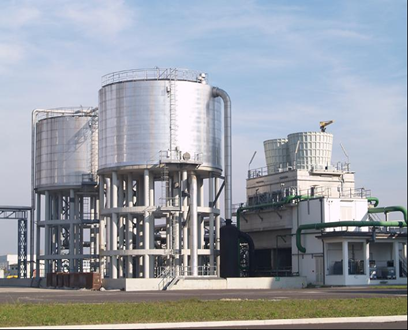
Geotermal source with 2+2 storage system
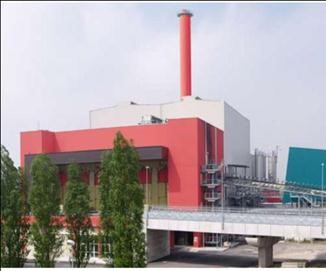
WTE
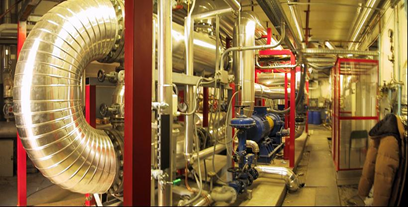
Gas boilers
The network “Berti-Pichat” in Bologna presents some significant challenges since it comprises two-temperature level (120 °C and 90 °C) heat and chill networks. As of 2014, the hot water network is 6 km long and the cold water network is 0.77 km long, with 47 users’ substations, delivering approximately 28 GWht/a. The energy mix comprises 2 separate 2.4 MWel CHP units (gas-powered endothermal engines), some gas boilers, absorption and compression chillers. The average supply/return temperatures are 120-70°C and 90-65°C for the two-level heat distribution and 6-12°C for the chill distribution.
The DH supplied heat to 58 consumers on 31/12/2017.
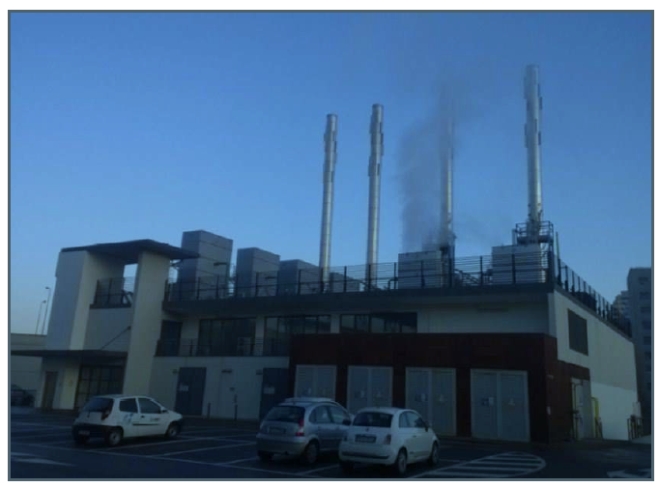
CHP units
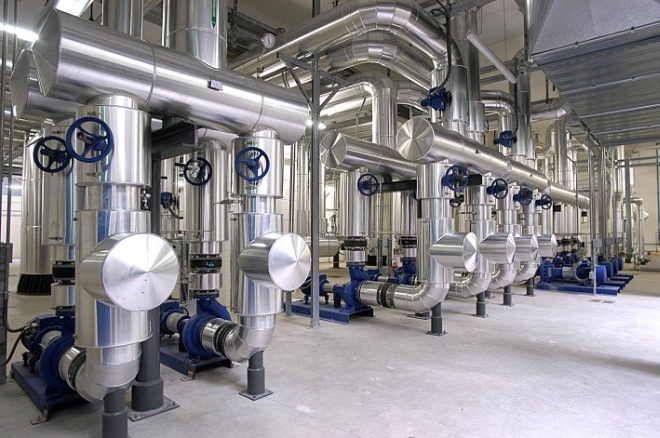
Gas boilers
The network “Ecocity” in Bologna is, as of 2014, 7.4 km long with 54 users’ substations, delivering approximately 22 GWht/a. The energy mix features 2 separate 1.85 MWel CHP units (gas-powered endothermal engines), a small heat storage (80 m3) and gas boilers. The average temperature levels are 90°C on the supply line and 65°C on the return line.
The DH supplied heat to 1,246 consumers on 31/12/2017, of which about 95% are residential.
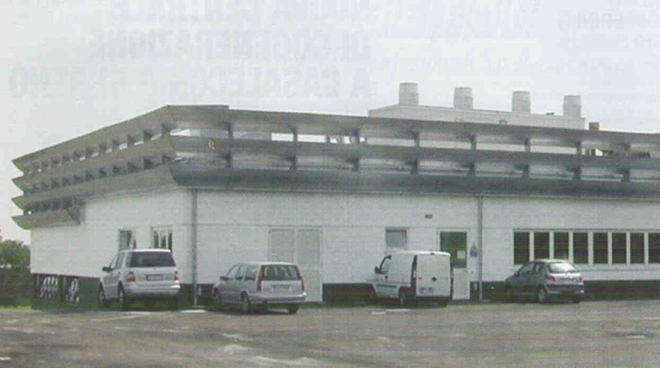
Cogeneration plant
The network “Barca” in Bologna is, as of 2014, 15 km long, with 120 users’ substations, delivering approximately 50 GWht/a. The energy mix involves 2 separate 3.9 MWel cogenerative gas turbines, presenting some challengingly tight technical constraints, and gas boilers. The average supply/return temperatures are 120-70°C and 90-65°C in a two-level heat distribution grid.
The DH supplied heat to 237 consumers on 31/12/2017, of which about 95% are residential.
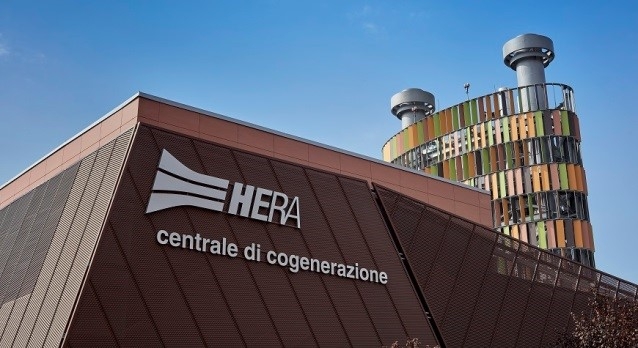
Potential improvement measures have been identified in advanced remote monitoring, heat generation and dispatching optimization, network pressure optimization, as well as interconnecting Bologna Berti-Pichat with the nearby San Giacomo generation plant (gas boilers).








